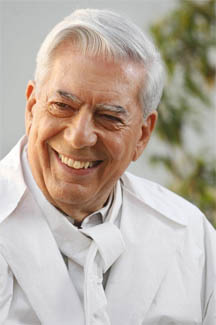Nobel Prize laureate Mario Vargas Llosa says in a new book that we are living in a “culture of entertainment” in which everything — including literature, journalism, politics and sex — is becoming increasingly trivial, and that this phenomenon can have disastrous consequences for mankind.

“Nothing. I’m all for having fun,” responded the Peruvian-born writer, speaking from his part-time home in Madrid, Spain. “But when we turn culture into only a form of amusement, into only a light way of having a good time, then culture loses its traditional function, which is to be… something that creates a critical attitude that helps us constantly put into question those things that we normally believe are unmistakable truths.”
Vargas Llosa said that, nowadays, “light” literature designed to amuse audiences is killing literature as an art form. In today’s 140-character Twitter world, there could not be a new Leo Tolstoy, James Joyce or Jorge Luis Borges, among other things, because the Internet is shortening people’s attention span, and making it increasingly difficult for many to read books.
“I’m not in any way criticizing technology, or the development of audio-visual communications,” Vargas Llosa told me. “But to completely replace books for screens amounts to replacing a kind of (demanding) intellectual effort by a minimal intellectual effort, and has consequences… It is creating an audience that no longer tolerates a big intellectual effort, an audience that finds itself fatigued, bored, distracted by books.”
Even sex has become an increasingly banal practice, devoid of eroticism, that is becoming a kind of sport in today’s culture of entertainment, he said. Recalling a recent decision by a municipality in Spain to offer masturbation classes in schools, he said that sex in today’s world is “losing its mystery.”
We are “tremendously trivializing an activity that, unless it maintains a certain dose of mystery and of privacy, can take us back to animal sex and to the disappearance of eroticism, which is the civilized and humanizing form of sex,” he said.

Vargas Llosa said politics, too, has become “much more a show than a debate over ideas.” He added that in today’s political campaigns, “the one who conquers the crowds is not the one who has the best ideas, but the best actor, the best entertainer, the best clown.”
Referring to other chapters of the book, in which he cites the world-wide success of Spain’s Hello magazine and the WikiLeaks phenomenon as examples of the degradation of today’s journalism, Vargas Llosa told me that “nowadays, even the most serious newspapers run the risk of losing readers unless they dedicate more space to social, artistic or show-business gossip.”
WikiLeaks was an example of irresponsible journalism, more aimed at entertaining than at informing, he said.
“The media’s somewhat cynical, disparaging, attitude towards politics contributes in a big way to the devaluation of politics, which I think brings about serious risks to our democratic culture,” he said. The media should carry out its adversary role, but trying “to correct what is wrong, rather than feeding on what’s wrong to amuse a scandal-avid audience,” he added.
Intrigued, I asked Vargas Llosa, a strong supporter of free-market policies, what remedy he suggests to keep the media from succumbing to the culture of entertainment without resorting to press regulations, and without interfering with the laws of supply and demand.
Vargas Llosa responded that he is against all kinds of media regulations, but that “I believe that a free market requires an intense cultural and spiritual life of society, so that the market does not end up destroying values, and so that it can work within certain ethical values.” The absence of a moral compass contributed, among other things, to the 2008 economic crisis that rocked the world, he added.
My opinion: I liked the book, and — while you can inevitably find things in it with which to disagree — I always admire Vargas Llosa’s intellectual courage. He doesn’t mind going against the politically-correct thinking of the moment and plunges into dangerous territories, not fearing the criticism that is surely going to come from many who only read him superficially.
Vargas Llosa makes you think about many things you take for granted, which is the best antidote against the culture of entertainment that is numbing our critical thinking.
© The Miami Herald, 2012. Distributed by Knight Ridder/Tribune Media Services.
